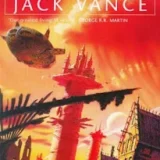
OBIR: Occasional Biased and Ignorant Reviews reflecting this reader’s opinion.

Pale Grey Dot – by Don Miasek
Publisher: Turnstone Press, Winnipeg, Manitoba, Canada, May 2024.
Premise:
Humanity has conquered the Solar System but failed to conquer itself. Everyone is on the verge of going berserk.
Review:
I am one who fears the advent of A.I. Ashamed to say the nature of my fear is tabloid fodder. I tend to visualize human-looking robots equipped with self-aware consciousness being hired in lieu of human workers, resulting in all of humanity permanently on welfare and at the mercy of robot administrators.
To put it another way, I see an either/or scenario. One day we’re in charge, then it’s the turn of A.I. and we become increasingly irrelevant, or maybe instantly irrelevant. Going to happen any day now, or so some “experts” would have us believe.
Be aware there are other experts who say excellent mimics of human thought and behaviour already exist, but true consciousness among machines is decades away and may not ever be possible. But if a robot is ordering you out of your job, does it matter if it’s the result of self-aware thought or merely sophisticated programming? The end result is the same. Either way you’re screwed.
This novel, taking place several centuries in the future, describes an intermediate stage which may well be more realistic than what you read in the tabloids or see on social media. Genuine A.I. does not yet exist. The principal problem is Elon Musk’s wet dream of human augmentation, namely individuals mentally connected to A.I. as a useful tool greatly enhancing perception, situational awareness, and the ability to manipulate others who are sadly dependent solely on what nature gave them. Information is power. Augmentation is power. And we all know how humans handle power, don’t we.
Yes, the future as shown in this book is an old-fashioned Gernsbackian paradise in that advanced technology has been harnessed to do wonderful things. Large colonies exist on the Moon, on Mars, on numerous moons elsewhere in the Solar System and in the asteroid belt. There are even two flourishing colonies in nearby star systems. So, naturally, the entire human race enjoys at a minimum a middleclass standard of living and an entitled leisure leaving us free to pursue intellectual and cultural delights.
Not a bit of it. The resources of the Solar System are being exploited for the benefit of Mother Earth, but life is hellish and getting worse. Turns out highly advanced technology is mindbogglingly expensive. The economics involved are shaky and vulnerable to fraud, cheating, and all the other human shenanigans focused on vast sums of money. Corruption is rampant. Worse, when the humans are kept at as low a subsistence level as possible, utilizing human labour turns out to be more cost-effective than maintaining a population of machines.
Puts me in mind of J. Paul Getty’s famous outburst when the stock market collapsed in 1929. He is alleged to have said, “Thank God! Now money will be concentrated in the hands of those who know how to use it.” In short, many a CEO believes money is wasted on ordinary people. “They just use it to buy beer and chips.”
Life on the “Pale Grey Dot” (the Earth) depends on whether an individual is augmented or non-augmented. The latter are the vast majority. So dire is the environment, the air scarcely breathable for instance, and so stretched the economy, always on the verge of collapse, that something akin to the War Measures policy of Canada during WWII is in place. If your job is of vital interest to the economy, you are not allowed to switch jobs, let alone move elsewhere seeking a better job. You’re stuck for the duration, for life.
As a consequence, boredom is your fate. Yes, anti-aging technology allows people to live for two or three centuries, but that amounts to a prolonged “prison sentence” of drudgery in a job a robot could do better but is too expensive to hire. With nowhere to go and nothing to look forward to, most people spend their small wages on cheap booze, drugs, and commercial sex. Much like today, in fact, but worse.
You would think, with the resources of the Solar System pouring onto Earth, that off-worlders dream of being sent there. Not at all. It’s considered a punishment to be transferred to Earth. That prospect is held over off-world employees as a threat to keep them in line. Meanwhile, everyone on Earth dreams of being assigned a job off world where pay and conditions are much higher, and the illusion of personal freedom somewhat more convincing. Can’t be done, unless you know “somebody” and can afford the bribes.
At least the government consists of ordinary human beings, democratically elected (more or less), but the Earth-centred authorities are hard put to keep control over the independence-minded colonies. Fortunately, the United Fleet is loyal. The primary function of its warships is to transport Space Marines from one colony to another, depending on where the latest unrest, rioting or outright insurrection is taking place. Pretty much an ongoing game of “Whack-a-Mole.” For young men on Earth, joining the Marines is the best way to escape Earth, and with luck they’ll wind up pensioned off in one of the better colonies. Space Marines are fiercely patriotic for that reason and no other.
There is no alien threat. Yet the fleet constantly inspects the shipping lanes in search of an enemy occasionally capable of doing battle. These are rebel vessels masquerading as commercial vessels owned by corporations. The problem is that the enemy, a loose coalition of ideologues, anarchists, nationalist fanatics, and piratical opportunists, are embedded within the off-Earth corporations and colonies and very hard to detect till they manifest themselves in hostile action. Collectively the enemy is known as the Syndicate. Uncounted millions fear them as terrorists. Just as many citizens view them as potential saviors who will deliver them from the merciless exploitation by Earth. Safe to say paranoia is a way of life everywhere in the Solar System.
Fortunately, civilization can depend on the Earth Security Service (ESS) to keep every citizen in their proper place. Everyone, including government bureaucrats and fleet admirals, fear the operatives of the ESS. For one thing, they have legally recognized absolute power. You know how, in some movies and TV shows, the FBI walk into a crime scene, flash their badges at the police and say, “We’re in charge now.” An ESS operative can do that in any situation, be it a job interview or a newly launched civil war.
This sort of power breeds resentment. The United Fleet hates being considered the second-rate security force. The government suspects the ESS believes it knows better than the Premier or cabinet ministers what decisions to make. And every citizen, loyal or disloyal, fears the taken-for-granted ESS right to make anyone disappear as if they never existed in the first place. The powers that be want to get rid of the ESS, but know they can’t, because the ESS is the only guarantee the powers that be will remain in power. The ESS has the upper hand.
The source of ESS power is twofold. First, they run the universal surveillance system which monitors virtually every conversation and human interaction in the Solar System. Consequently, people take for granted everything they say or do is known to the ESS, unless countered by measures known to the Syndicate. Basically, most people habitually speak and act as if they are performing for ESS. And so they are. The billions of information sources are correlated by individuals massively augmented with A.I. and thus fully capable of processing the enormous ongoing avalanche of data. But these human super-computes are merely in the background of the system and are not what citizens fear.
The second source of ESS power is the individual mobile operatives who usually masquerade as ordinary people. A clerk, perhaps, or a police officer. These the people fear. Body enhancements and rigorous life-long training make them formidable agents and merciless killers. Further, augments allow them to access the ESS data base and instantly know everything there is to know about a person or organization of interest. Fight one operative and you’re fighting the entire ESS. Intimidating. Terrifying.
The creepiest thing about the operatives is that they are in mental communion with the A.I. entity in charge of them all. She functions as a great mother. Despite the vast scale of their collective A.I. augmentation, it is not logic or rationality which binds their loyalty to the ESS. If that were the case they might rationalize taking advantage of their power for their individual goals, perhaps seek to rule as Emperor, or become the living god worshipped by all. Nope. Their sole motivation is to be worthy of “her” love. She loves them all and tells them so. They compete for her approval, for her love. No other force can break this bond. None would dare to betray her.
Irony of ironies, that a collective of humans altered into machine-minds are bound together with one of the most powerful emotions known to us, a mother’s love. Its attraction is addictive. Not for nothing is the automatic tug at the heart strings whenever she speaks known as “the pull.” It cannot be resisted. Thus the most powerful secret police ever created is motivated, not by fear, but by an abundance of love. This is a perverted dystopia of the highest order. Could it be our impending fate?
Now, all of the above may seem like spoilers, but that’s not the case. I’ve merely laid out the background wherein the action takes place. What sort of action?
The three main characters are ESS operatives, each typical of their type. One is a rogue operative who has abandoned the ESS and remains hidden despite their best efforts to track her down. This, by virtue of the built-in interaction capacity of her mind, is supposed to be impossible, yet she survives unseen and presumably up to no good.
A second was expelled from active operative status for reasons of inadequacy and now commands a warship of the United Fleet. She’s quite bitter at being rejected and is determined to resist the “pull” should it ever return. She is utterly devoted to the Fleet.
The third functions joyfully as a beloved operative and is so proud he is still loved despite his many faults and mistakes. He constantly tries harder to be perfect and worthy of “the pull.”
All three knew each other in the past and wind up being thrown together again, albeit at cross purposes. Other operatives get sucked into their competitive interaction, and many innocent bystanders as well. Sound boring? Far from it. A lot of people get killed. The action jumps about various fascinating locations, including the enfeebled earth, a devastated Mars still recovering from the last insurrection, a complacent Jupiter orbital station, a fading Ganymede colony suffering from a decline in tourism, and so on. Wherever mankind has screwed things up, the reader is given a tour. Never mind the struggle to establish colonies. What about the more difficult effort to keep their economies functioning?
If I were to criticize, I might say, so to speak, that the entire “Game of Thrones” (or any other lengthy series) has been compressed into a single novel. Events and characters come thick and fast. The reader has to pay attention at all times. But real life doesn’t often grant you the chance to pull back and quietly contemplate events before plunging back into the fray, so why should a fictional reality? The quick pace of events adds to the authenticity of the setting and what’s at stake.
Further, the style of writing is clear, precise, and relatively simple. No run-on sentences for the sake of literary effect. This greatly clarifies the task of understanding what is happening. The reader never gets bogged down. Everything flows swiftly.
The real complexity comes in the character interaction. All is not as it seems. Everyone strives to fulfill their tasks but have hidden agendas in that they want to exploit the current crisis for their ultimate personal benefit, though in some cases purely for the sake of winning love and approval. Others want to bring down the system. Some want revenge. Some hope merely to survive. All portray themselves to each other as working for the greater good. Motivation may be simple, but the consequences are complex and demanding. Of necessity, success is a string of multiple victories. Break the string at any point, and failure, perhaps catastrophic failure, is the inevitable result.
In short, every character is faced with multiple challenges, one after the other, and the reader, who never knows what is going to happen next, is in for a rollercoaster ride through a kaleidoscope.
Another mark of a good writer is, that while the action swings from one point of view character to the next, it remains easy for the reader to identify with almost all the characters, barring a few nasty pieces of work. Consequently, the readers find themselves frequently shifting their own point of view, thereby gaining a comprehensive understanding of what is going on and why. A very immersive writing technique.
One conclusion I have drawn: betrayal is an underrated ploy. From this book’s plot I judge it can in fact be very useful. Machiavelli would approve of this book. Much to learn.
CONCLUSION:
“Pale Grey Dot” is complex yet a pleasure to read. What I consider particularly brilliant is the theme that A.I. augmented humans may pose a far greater threat to humanity than A.I. by itself and may well come as a threat much sooner.
I also enjoy the emphasis on economic necessity inevitably dictating the exploration and exploitation of the resources of the Solar System, but that it will be so expensive it will warp the economy into something akin to a wartime economy at the expense of everyone’s standard of living.
The two themes combined suggest our near future will indeed produce marvels, but to the benefit of virtually no one. Not quite what Gernsback had in mind when he advocated technological advancement. I fear this dystopia is more likely.
At any rate, this book is a very original take on what many of us fear. One heck of a debut novel.
By the way, Don told me the title “Pale Grey Dot” is inspired by the famous photograph taken by Voyager One showing the Earth as a pale blue dot against the black void of space. The title references the Earth. But Don changed it, I suspect, to “Pale Grey Dot” to reflect the failing environmental conditions of our near future. Evocative and sad at one and the same time. Given the premise, an appropriate title.
Find it at: < Pale Grey Dot >









